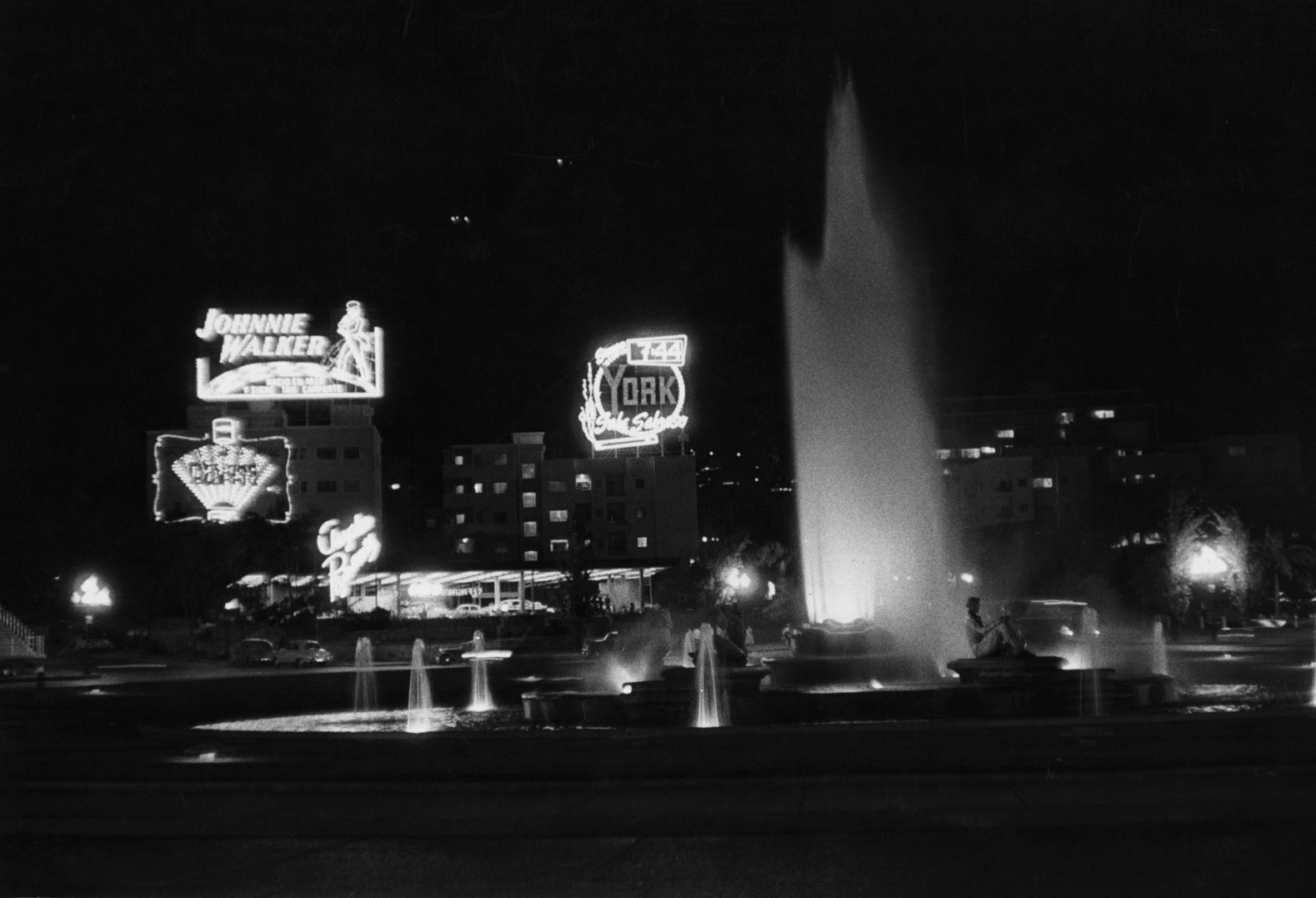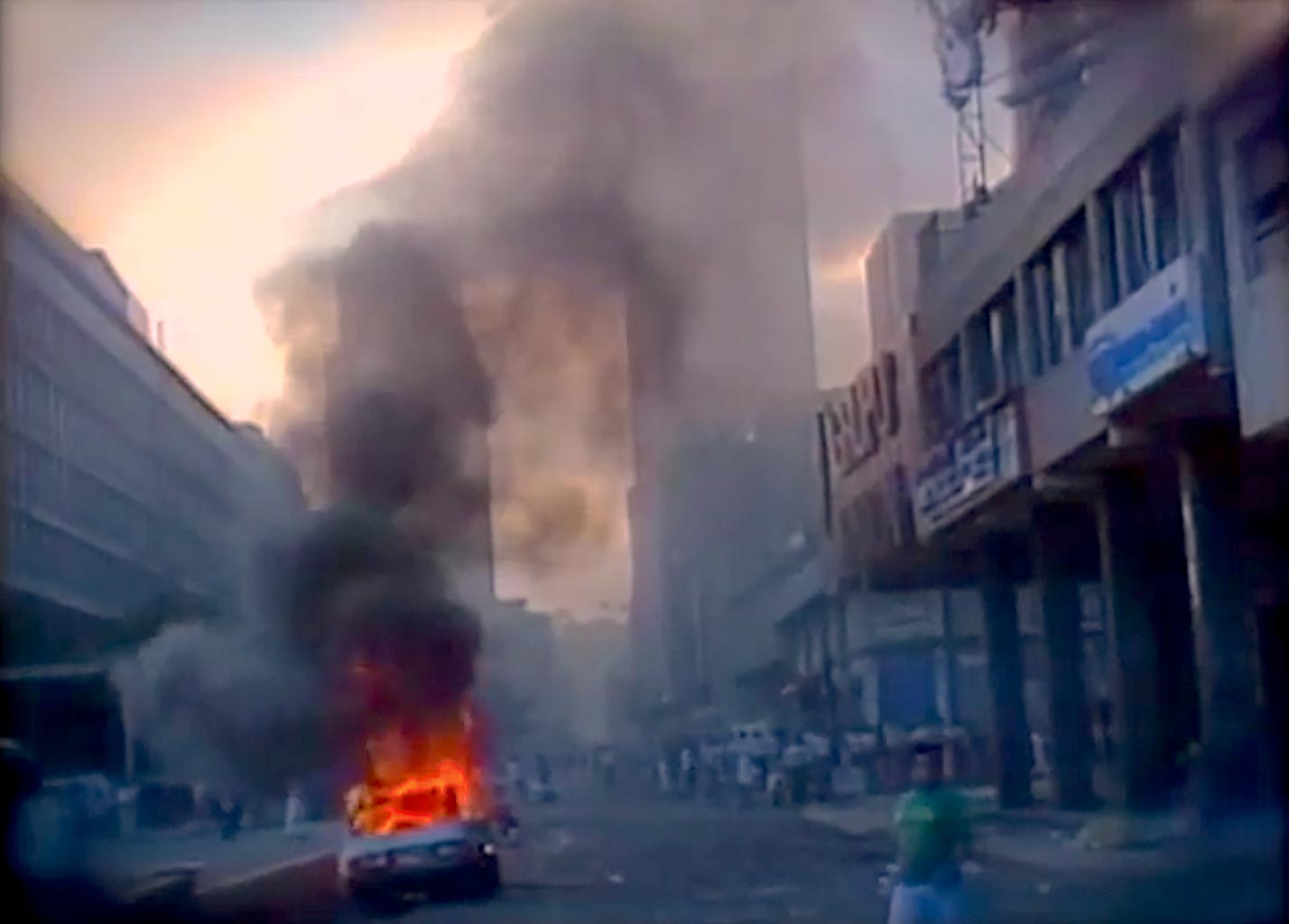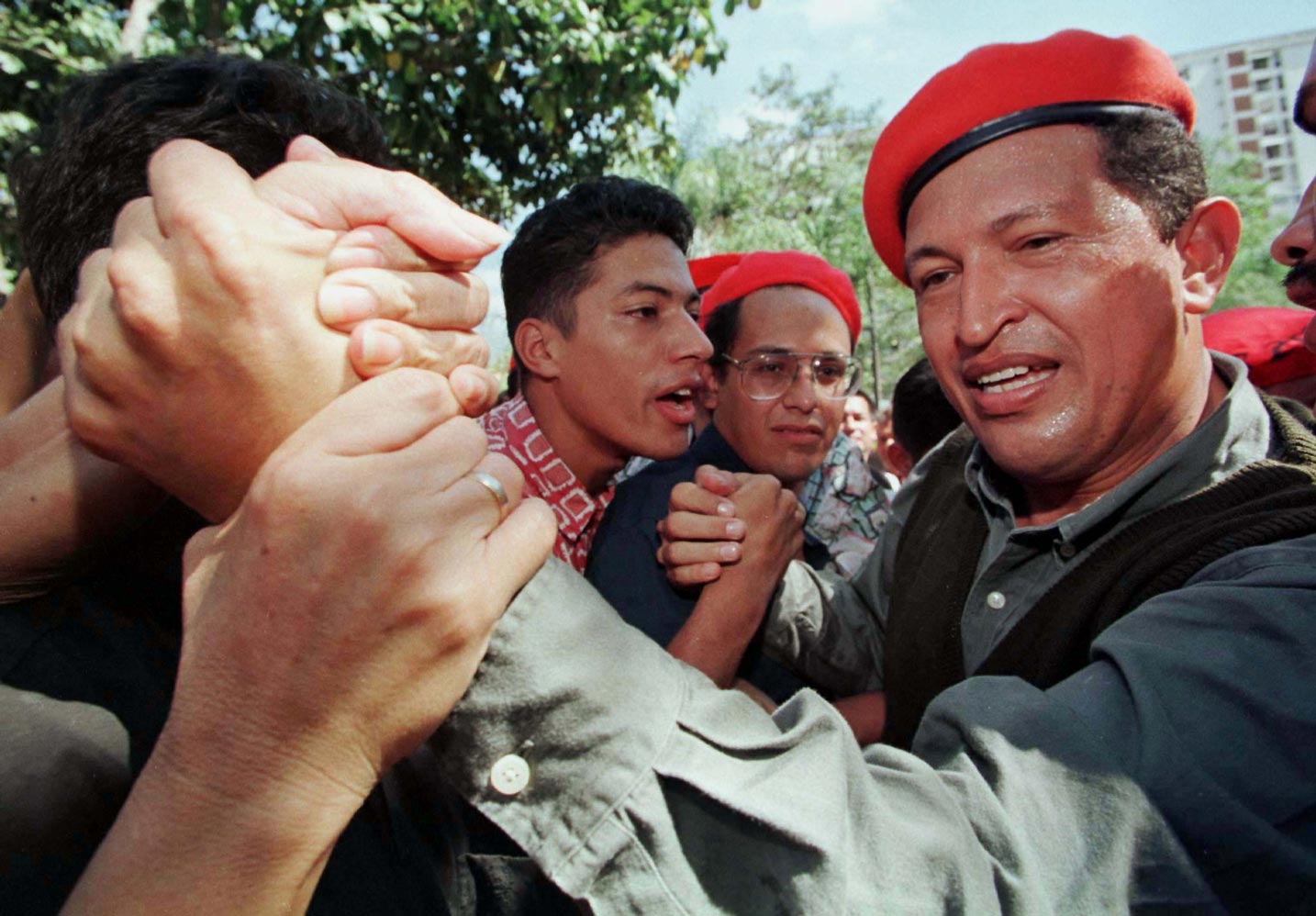The Story So Far
By the mid-20th century, Venezuela had evolved into an international hub – flourishing with economic success, political freedom, and visitors from around the world. This was due in part to the country’s oil reserves, robust institutions, increased immigration from multiple countries and strong democracy. The wealth of Venezuela soared: the country’s GDP grew 250% between 1958 and 1977, giving Venezuela the fourth largest GDP in the world – however inequality also grew.

"The Great Turnaround"
Trouble began brewing in the late 70s and early 80s, as inflation soared and foreign debt hit a crisis level. In 1989, Presdient Carlos André Perez attempted a fix with his liberalized economic package “El Gran Viraje” (“The Great Turnaround”), however the timing of its implementation only made matters worse.
Caracazo – 468 Deaths
February 1989 – As a result of Perez’s economic package, prices of oil and other goods soared, making it so Venezuelans could not afford basic goods. On February 27, 1989, the people took to the streets in Caracas and started looting stores, but their actions were met with military force. Some officials openly fired on its citizens, killing 468 people, and temporarily suspended citizens’ constitutional rights. The event served as a catalyst for what came next: Hugo Chavez’ coup d’état.

“We have failed, for now”
February 1992 – Enraged by the actions of the government during Caracazo, former president Hugo Chavez, a lieutenant coronel at the time, led a military rebellion to overthrow the sitting administration. Although unsuccessful in his coup attempt and leaving dozens of people killed, Chavez became recognized as a hero of the people. He was jailed for his unconstitutional actions, but received a presidential pardon the following year from President Rafael Caldera, which allowed Chavez to run for office in 1998.
Presidential Election: The Beginning of the Socialist Experiment

In December 1998, Hugo Chavez was elected president by a landslide 16-point victory.
1999 Constitution
Immediately after his election, President Chavez convened a Constituent Assembly, made up of almost entirely his supporters, to write a new constitution. Chávez’s unilateral decision to change the constitution was seen as unnecessary. This bold display of power began to worry many Venezuelans.
Power Grab
April 2002 – Although there is still a debate if it was a “coup d’état” or a “power vacuum,” the Opposition led a grab for power and briefly took over the government. Once in power, the Opposition immediately “dissolved the country’s democratic institutions, suspending the legislature and disbanding the Supreme Court.” However, after only 40 hours Chavez was restored to power, and retaliated by jailing and expelling opposition leaders.
Oil Strike
December 2002 – February 2003
18,000 workers fired from PDVSA
40% of PDVSA workers fired, with the stroke of a pen
As a secondary attempt to increase pressure on Chavez’ administration, the workers and managers of the national oil company Petroleos de Venezuela, S.A. (PDVSA) launched a strike. As a result, oil production and access to oil plummeted. President Chavez, infuriated by the strike and still on edge from the attempted coup, responded by firing 18,000 employees from PDVSA, almost 40% of the company’s workforce. Consequently, Venezuela’s top talent in the oil industry fled to other countries, most notably Colombia and the United States. This also triggered a change in the nature of PDVSA – from a private oil company to a branch of the Executive Office and a financial tool for the government to implement both domestic and international policies.
National Assembly Elections
December 2005 – When the elections for the National Assembly came around in 2005, the opposition parties chose not to participate because they believed the government was prepared to commit fraud and intimidate or blacklist voters who had previously signed petitions against Chavez. As a result, pro-government parties won 100 percent of the seats and the opposition lost all ability to influence policy.

Chavez Policies
Regional Policies:
Chavez, in an effort to band together with like-minded Latin American countries against the “interference” of the United States, helped form many regional groups including ALBA (2004), CELAC (2010), and UNASUR (2008).
Reign of Terror:
Freedom of Expression- (Nov 2010) Upholding censorship: The Supreme Court ruled that anti-government messages could not be played on television.
- (Dec 2006) Chavez forced RCTV off air, one of only two remaining non-cable television stations critical of the government.
- The government used a list of people (‘Lista Tascon’) who had signed a petition to have an election to oust Chavez for discriminatory purposes, forcing public employees to rescind or be fired.
- The Chavez regime interpreted the 1999 Constitution in a way that allowed them to regularly intervene in labor unions’ elections, and requiring that they are supervised and certified by the government.
- The Maduro regime implemented a systemic policy of torture against those who opposed him. There are over 350 known cases of beatings, electrocutions, drownings, the use of tear gas, and sexual abuse, carried out by the government against its own citizens. The abuses are currently under preliminary investigation by the International Criminal Court.
- Court Packing: (May 2004) Re-Packing the Supreme Court: In 2004, Chavez signed a law which increased the number of Supreme Court judges from 20 to 32, which allowed the pro-government parties to pack the courts with Chavez loyalists. Between 2004 and 2016, the Supreme Court made over 45,000 decisions but never once rule against the presidency.
- Property Rights: Weakening property rights and suffocating the private sector have been part of the regime’s economic policy playbook. More than 1,200 private companies were expropriated during Hugo Chavez’ administration from 1999 to 2013.
- Domestic Production: in 2003, Chávez implemented a series of price controls with the intention of ensuring poor Venezuelans could afford goods. However, keeping the prices artificially low meant many Venezuelans producers could no longer turn a profit, and therefore they stopped producing. As a result, Venezuela drastically reduced its ability to provide for its own citizens, leading to shortages of food, medicine, and other essential goods.
- 2010, Chavez supporters file a series of criminal charges against NGOs for receiving funding from foreign entities. The impact of these complaints was even more concerning, due to the Supreme Court ruling that these NGOs could be tried for treason – punishable by up to 15 years of prison.
- Chavez established a series of “missions” to provide social services to poor Venezuelans (e.g. free education, medical care, and food subsidies), but the programs were hugely expensive, ineffective, unsustainable, and entirely political. An evaluation preformed later found that only 10% of Venezuelans benefited from the missions.
A Step Backwards for Chavez
December 2007 – President Chavez had become accustomed to the ability to create any law he wanted. However, when constituents voted against his 2007 proposal to alter 69 articles of the Constitution, Chavez had to admit defeat for the first time since his presidency began. Despite this failure, the National Assembly, packed with Chavista loyalists , was able to pass the changes through legislation over the following months.
Venezuela sin Chavez
Hugo Chavez’s death due to a malignant cancer was announced in March 2013. Before he died, Chavez appointed his Vice President Nicolas Maduro as his successor – a decision some allege was influenced by the Cuban government.
The Era of Maduro
April 2013 – Nicolás Maduro was declared President of Venezuela with 50.8% of the votes, in an election that was widely believed to be fraudulent.
Opposition Regains Some Power
December 2015 – The 2015 National Assembly elections served as an outlet for Venezuelans to express their discontent with Maduro’s policies and the rapidly decreasing quality of life in Venezuela. The Opposition candidates won 112 seats out of a total 167 seats . The victory was even more impressive considering the election process was widely suspected to be rigged in favor of the government party .
Institutional Meltdown
April 2017 – In response to losing a majority in the National Assembly for the first time since 1999 , the Chavez loyalist-stocked Supreme Court ruled to strip the National Assembly of its power. This move was the final straw to officially push the international community to declare Venezuela a dictatorship.
Public Outcry – Protests and Referendums
April-July 2017 – Infuriated by the government’s blatantly unconstitutional maneuver to strip the Opposition-led National Assembly, the people of Venezuela were reinvigorated to voice their outrage through the only means left to them.
Referendum
July 16, 2017 – The Opposition-led National Aseembly used its constitutional power to call for a public referendum on the Maduro regime, however the government used its loyalist-stock supreme court to declare the vote illegal. Instead, the Opposition held a symbolic referendum, aimed at discrediting the Maduro regime by illustrating to the world the people’s disapproval of his leadership. Voters were asked three questions, and 98% of voters voted against the Maduro regime. Venezuelans cast their vote at poll stations throughout the country and throughout the world – as the diaspora voted in 500 international cities in over 100 countries .
Constituent Assembly
July 30, 2017 – Despite the outcry of the public and results of the referendum, Maduro used a presidential decree to complete a self-coup by creating a Constituent Assembly, which would take over all lawmaking powers in place of the elected National Assembly. The Constituent Assembly, put in place through fraudulent elections , is considered illegitimate by the international community and its institution was a breaking point for Venezuela.
163 Deaths
Between April and August 2017, Venezuelans held 6,729 protests throughout the country ( 56 protests a day) in which 163 people were killed, over 2,000 injured, and 4,451 arbitrarily arrested.
A COLLAPSED COUNTRY…
Social Well-Being:
- Venezuelans have lost 24 pounds on average in the past year and are averaging less than one meal a day
- Infant and child mortality have increased
- Increases in infectious diseases (including malaria), and other non-communicable diseases such as diabetes
- At any given time, pharmacies have a shortage of approximately 85 percent of drugs , forcing people to rely on black market products.
- Funding for schools has been cut dramatically , causing educational facilities to crumble and students to drop out. Professors have left in droves as their average salary has become between $6 and $25 per month.
- Hospitals receive only 3-12 percent of the supplies and medicines they need to operate.
- The number of hospital beds available nation-wide has dropped to 25,000 – when a nation of Venezuela’s size should have closer to 100,000. This has led to women giving birth in waiting rooms, patients sleeping and receiving treatments on the floor, and outbreak of diseases.
- Each day, more than 35,000 Venezuelans cross the border into Colombia.
- Only 12% of Venezuelans report feeling safe walking at night where they live (the lowest of any country in the world)
- In 2014, there was a 170% overcrowding of prisons, with 51,256 prisoners and a penitentiary capacity for 19,000 individuals
Economy:
Justice & Reconciliation:
- Between April 1 and December 31, 2017, there were 5,475 arbitrary arrests in Venezuela.
- At the end of 2017, there were 214 political prisoners in Venezuela.
- Since Maduro came to power , 6,893 people have been arbitrarily arrested, and 433 have become political prisoners.
- There were over 8,000 extrajudicial executions carried out by the Venezuelan government between 2015 and 2017.
- According to the Venezuelan nonprofit Espacio Públcio, there were 366 violations of freedom of expression in 2016 in Venezuela, a 28% increase from the previous year.
- More than 49 media outlets were shut down by the government in 2017.
Governance & Participation
- 92% of homicides go unpunished.
- In 2017, Venezuela had only 1.15 police officers per 100,000 inhabitants, while the world average is 319.34 police officers per 100,000 inhabitants
- Venezuela is ranked #6 in the world for impunity